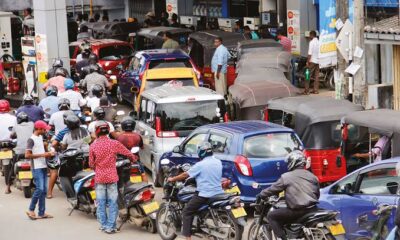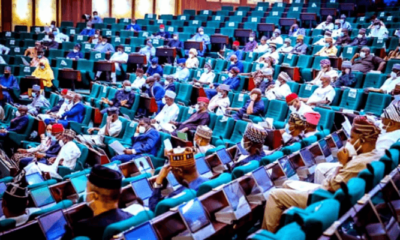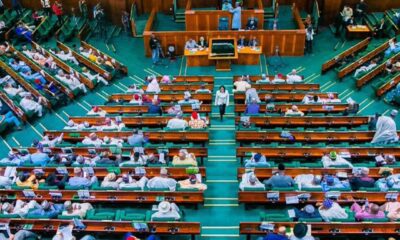Business
Reps committee mulls establishment of Maritime Bank

By Seun Ibiyemi
The House of Representatives Committee on Shipping Service, on Thursday, mulled establishment of a marítime bank for the development of the nation’s shipping sector.
This was disclosed by the chairman of the committee, Hon. Abdulsamad Dasuki, when he paid an oversight visit to the council headquarters in Lagos.
Dasuki, who stated that creating Marítime bank will stop capital flight, however, disclosed that the committee was planning to have a meeting with the Shipowners for effective service delivery in the country.
“The committee is looking at the possibilities of establishing a maritime bank so that the marítime sector will have its own bank and the Shipowners will have their bank as this will help stop capital flight,” he stated.
Dasuki further stated that the bill to give the council backing as port economic regulator has passed second reading in the house of representatives.
According to Dasuki, the bill will be a catalyst for changing the nation’s economy, saying the council will perform exceptionally when the bill is passed into law.
“We have taken note of most of the issues you highlighted, the successes and challenges. The NSC is the port economic regulator which is operating with regulation and by God grace the bill to make the agency a true regulator has passed the second reading and we will soon call for public hearing, that bill will be a catalyst for changing the economy. Also, the Shippers’ council will do better when the law is passed,” Dasuki stated.
The committee chairman also spoke about the one percent freight stabilisation fund, saying, “We have taken note as well of the current issues that are happening with the Federal Ministry of Finance (FMOF), with 50 percent of your revenue and you will get support to get the fund due to your agency. We expect you to deliver more and bring more money to Nigeria. You said NSC will ensure that the GDP of Nigeria goes up through your contributions by the end of 2024.”
Speaking earlier, the executive secretary of NSC, Pius Ukeyima Akutah, sought the support of the House of Representatives Committee on Shipping Service on getting approval for the 1 percent freight stabilisation fee statutorily embedded in the council’s act.
Akutah said once the Oronsaye report is fully implemented, the council will no longer get its statutory 2 percent share from the 7 percent Port Development Levy.
”There is a need for us to implement our statutory funding, which is the 1 percent Freight Stabilisation Fee. I think this is very pivotal at this time that the Oronsaye Report is being implemented. Once the Oronsaye report is implemented, the 7 percent Port Development Levy which the Shippers Council gets 2 percent from, may no longer be available. So, I think we need to work very hard to ensure that the Nigerian Shippers Council funding position is secured.”
Akutah also disclosed that since the council’s mandate has been expanded to be the port economic regulator, there is need for a law that will back up its new mandate.
According to him, the council has been at the forefront of facilitating trade and also ensuring efficiency of the port for business to thrive and for the government to make more money.
‘’Today is a very important day, first of its kind, especially since I resumed here. The mandate of the council has been expanded and we are to do more as Port economic regulators. We have a lot to do to regulate the sector and President Bola Tinubu has created Ministry of Marine and Blue Economy with the mindset to focus on blue Economy, and to diversify nation’s economy from crude.
“Our mandate is to facilitate trade and ensure efficiency of the port for business to thrive and for the nation to make more money, create opportunities for youth empowerment, job creation and others.
“And now that we have a committee for shipping service and with their collaboration, we will see rapid development in the sector. We are grateful to receive you today and we know that the impact of the visit will live with us for a long time. We need to contribute to the GDP and the nation’s economy and to acheive this, we need your protection.
“We have some bills before the national assembly such as repealing the council act to be Port economic regulator and you have tried to see to the passage, the bill is operational to carry out our mandate because without it, it will be difficult for us to achieve our mandate,” he stated.
Business
May Day: ACCI tasks FG on conducive environment for workers


The Abuja Chamber of Commerce and Industry (ACCI) has urged the Federal Government to provide a conducive environment for workers to ensure efficiency and effectiveness.
The President of ACCI, Emeka Obegolu, said this in his message to commemorate the 2024 Workers’ Day.
“The chamber applauds all workers in Nigeria for their effort, hard work, and dedication toward the national economic growth and development of the country.
“To mark the occasion, I urge the federal government to continually create a friendly working environment for the Nigerian workers and provide the necessary materials and resources needed for an efficient and effective workforce.”
The theme of the 2024 celebration is “Safety and Health at Work in a Changing Climate.”
According to Obegolu, the theme is apt and has significant implications for the Nigerian business community.
He said that climate change exposed workers to various health risks, such as heat stress, and extreme weather events as well as natural disasters which could disrupt business operations and supply chains.
“Businesses need to assess these risks and implement measures to protect the health and well-being of their employees.
“There is also a need to have resilience plans in place to ensure business continuity and minimise the impact of climate-related disruptions,” he said.
The ACCI president called on government at all levels to introduce new regulations and policies related to workplace safety and health in the context of climate change.
Obegolu said businesses needed to stay informed about these changes and ensure compliance to avoid legal and financial consequences.
He said, “Commitment to workers’ safety and health in the face of climate change can enhance a business reputation and build trust with employees, customers and other stakeholders.
“We (ACCI) will continue to advocate safety and health at the workplace in a changing climate.
“This is because we are a chamber of commerce that seeks not only the interest of the business community but also that of workers.
“I wish all Nigerian workers a happy Workers’ Day on behalf of the executive council and members of the chamber,” he said.
Business
Dangote Refinery will get valid operating licence soon – FG


The Federal Government announced that it is set to issue a fully valid operating licence to the 650,000 barrels per day capacity Dangote Petroleum Refinery.
It announced this at the Stakeholders’ Consultation Forum on Midstream and Petroleum Host Community Development Trust Regulations organised by the Nigerian Midstream and Downstream Petroleum Regulatory Authority in Abuja.
The NMDPRA, an agency of the Federal Government, however, explained that though it had awarded a pre-commissioning licence to the $20bn refinery, a fully valid operating licence would be issued to the Dangote refinery soon.
Dangote refinery was inaugurated by former President Muhammadu Buhari in May 2023. The facility started releasing Automotive Gas Oil, popularly called diesel to the domestic market in April this year. It has yet to release Premium Motor Spirit, popularly called petrol.
Speaking at the forum in Abuja on Tuesday, the Chief Executive, NMDPRA, Farouk Ahmed, told industry players and other stakeholders that the authority would issue a fully valid operating licence to the refinery very soon.
Ahmed, who was represented by the Executive Director, Distribution Systems, Storage and Retailing Infrastructure, NMDPRA, Ogbugo Ukoha, pointed out that currently, only three refineries have valid licences.
“We have issued three refineries with three valid licences. We awarded to Dangote refinery even in their pre-commissioning and sooner than later they will have full commission and a valid licence to also operate,” he stated.
He also stated that about 15 gas facilities across the country have valid licences while more are undergoing processing.
The NMDPRA boss said there are 1,199 facilities with valid licences in the downstream, while more than 176 operators hold gas import permits.
Ahmed said 130 depots have valid licences while 69 hold valid coastal vessel licences, adding that NMDPRA has licensed 9,464 retail outlets as of 10 am on April 30, 2024.
“In the gas processing facility within the midstream, there are about 15 of them with valid licences. And much is under processing. If you go to the downstream sector, in the gas state of the downstream, more than 1,199 facilities have NMDPRA valid licences.
“More than 176 operators hold gas import permits. In the liquid licensing side of the downstream, there are 130 depots with valid licences and coastal vessels of more than 69 valid licences as of today. And in the retail outlets, we have 9,464 licensed retail outlets as of 10 am today, April 30,” Ahmed stated.
He explained why locations in the midstream and downstream arms of the oil sector were included as part of host communities, stating that emissions and effluence affect them.
Ahmed said the authority organised the forum for stakeholders to ventilate their ideas and proffer measures that would further enable the NMDPRA to relate better with host communities in the mid and downstream arms of the oil sector.
Business
Cost of healthy diet stood at N982 in March – NBS


The National Average Cost of a Healthy Diet (CoHD) per adult a day stood at N982 in March 2024, the National Bureau of Statistics (NBS) has said.
The NBS said this in its CoHD report for March 2024 released on Tuesday in Abuja.
The bureau said the CoHD in March increased by 4.7 percent compared to the N938 recorded in February.
The NBS said the CoHD was the least expensive combination of locally available items that met globally consistent food-based dietary guidelines.
It said it was used as a measure of physical and economic access to healthy diets.
“This is a lower bound (or floor) of the cost per adult per day excluding the cost of transportation and meal preparation.”
The bureau said that to compute the CoHD indicator, the following data on Retail Food Prices, Food Composition Data, and Healthy Diet Standard were required.
The NBS also said that in March, the average CoHD was highest in the South-West at N1,198 per adult per day, followed by the South-East at N1,140 per day.
It said the lowest average CoHD was recorded in the North-West at N787 per adult per day.
The NBS further said that at the state level, Ekiti, Lagos, and Abia recorded the highest CoHD at N1330, N1249, and N1215.
The bureau said Katsina recorded the lowest CoHD at N739, followed by Sokoto and Zamfara at N758 and N766.
The NBS said CoHD had steadily increased since the first CoHD report by the bureau in October 2023.
“The CoHD in March 2024 is 40 per cent higher than what was recorded in October 2023 at N703 and five per cent higher than CoHD in February 2024, which was N938.
“The food groups that have driven the increases in CoHD the most are vegetables, starchy staples, and fruits. The cost of meeting the recommendations for oil and fats have changed the least.”
According to the report, animal-source foods are the most expensive food group recommendation to meet in March, accounting for 37 percent of the total CoHD to provide 13 per cent of the total calories.It noted that fruits and vegetables were the most expensive food groups in terms of price per calorie.
“They accounted for 12 percent and 14 percent, respectively of the total CoHD while providing only seven per cent and five per cent of total calories in the Healthy Diet Basket.
“Legumes, nuts and seeds were the least-expensive food group on average at six per cent of the total cost.”
The report also said that in recent months, the CoHD had risen faster than general inflation and food inflation.
“However, the CoHD and the food Consumer Price Index (CPI) are not directly comparable.
“The CoHD includes fewer items and is measured in Naira per day, while the food CPI is a weighted index.
“The food CPI increased approximately by four per cent between January and February, while CoHD increased by nine per cent.”
The NBS said the policy implications of these results would foster collaboration among a wide range of stakeholders, such as policymakers, researchers and civil society actors that focus on food security.
“These stakeholders will devise strategies that tackle access, availability, and affordability of healthy diet effectively.
“Also, future research incorporating income can also be used to determine the proportion and number of the population that are unable to afford a healthy diet,” the report said.
-
capital market2 years ago
Rt.briscoe, FBNH, Others halts negative performance of stock market
-
Finance3 months ago
Court orders Sen. Victor Umeh to repay N136m bank debt to AMCON
-



 Abuja Update2 months ago
Abuja Update2 months agoUNDP, FG partnership needed to achieve inclusion, equity- Minister
-
Abuja Update1 month ago
Banks drive stock market performance with N147bn gain
-



 Business1 week ago
Business1 week agoTingo Group unveils Tingo Electric, Tingo Cola drink at Lagos launch
-



 Health2 weeks ago
Health2 weeks agoCapacity training will reduce migration of health workers- NPHCDA
-
News4 months ago
Oil thieves sponsoring malicious media campaign against Navy – Spokesman
-



 Infotech1 month ago
Infotech1 month agoWorld Backup Day: NITDA urges Nigerians to ensure backup of data














